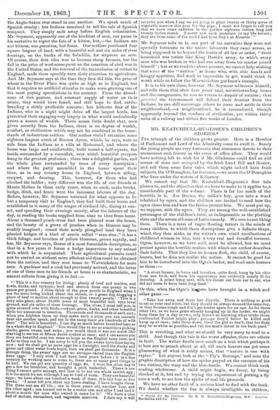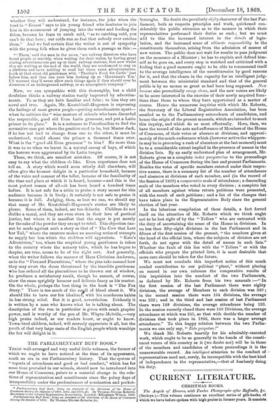MR. KNATCHBULL-HUGESSEN'S CHILDREN'S STORIES.*
THE triumph of the children grows greater. Here is a Member of Parliament and Lord of the Admiralty come to swell it. Surely the young people are very fortunate that statesmen devote to their amusement such leisure as the cares of office allow. They would have nothing left to wish for if Mr. Gladstone could find an odd corner of time not occupied by the Irish Land Bill and Homer, and tell them some fairy tales, which might indeed have Irish subjects, the O'Donoghue, for instance,—we mean the O'Donoghue who lives under the waters of Killarney.
We cannot say that Mr. Knatchbull-Hugessen's first tale pleases us, and the objection that we have to make to it applies to,a considerable part of the volume. There is far too much of the horrible in it. Joe Brown, the miller's boy, goes into a wood inhabited by ogres, and the children are invited to read how the ogres chase him and how the fairies protect him. We must put up, we suppose, with the ogres. They are among the well-established personages of the children's tales, as indispensable as the plotting slave and the severe old man of Latin comedy. We own to not liking them. There is a mass of vague floating terrors in the minds of many children to which these descriptions give a definite shape, which they thus make, as the writer's own vivid recollections of childhood witness to him, into a very real and dreadful torment.
Ogres, however, as we have said, must be allowed, but we must protest againt the horrible realism with which our author describes their habits. That they live on human flesh, the child, of course, knows, but he does not realize the notion. It cannot be good for him to be introduced into the Ogre's larder, and read such horrors. as these :—
" A stout farmer, in boots and breeches, quite dead, hung by his chin_ from one hook, and from his appearance was evidently nearly fit for dressing. A priest hung next, with his throat cut from ear to ear, who did not seem to have been long dead."
Or this, when the Ogre's keopers have brought in a witch and other game :—
" Take her away, and dress her directly. There is nothing so good to eat as your real witch, but they should be always dressed the same day, or they become tough and don't get tender again for an age. As for these other two, as we have game already hanging up in the larder, we might. keep them for a day or two, only there's no knowing what tricks those confounded Fairies might play ; perhaps they'd better be killed and hung up at once ; take them down, bleed the girl to death, that her flesh may be as white as possible, and cut the man's throat in the back-yard."
This is revolting, and what we should be very sorry to read to a child. And though this tale is the worst offender, there are others in fault. The writer dwells dyer-much on a text which perhaps it is best not to preach about at all, till one's hearers can get some glimmering of what it really means, that "nature is one with rapine." Let anyone look at the " Fly's Revenge," and note the graphic description of how the spider preyed on the carcases of his two victims, the wasp and the blue-bottle. We cannot think such reading wholesome. A child might begin, we fancy, by being shocked at it, but end by trying the experiment of putting a fly into a web, to see how the spider of real life proceeds.
We have no other fault of a serious kind to find with the book. We doubt whether the fun is always intelligible to children,
* Stories for My Children. By E. Ii. linatchbull-Hugessen, M.P. London_ Macmillan and Co. 1869.
whether they will understand, for instance, the joke when the toad in " Ernest " says to his young friend who hesitates to join him in his amusement of jumping into the water and feeding the fishes, because he fears to catch cold, "as to catching cold, you can't do that here ; our colds run so fast that nobody ever catches them." And we feel certain that the writer is out of sympathy with the young folk when he gives them such a passage as this :—
", These,' said the man in the moon, are railway directors who have bored people so terribly, when waiting for their trains, by having great staring advertisements put up at their railway stations, that now whilst they are waiting at the end of the world, they are condemned to stay on a platform and have nothing to road but these same advertisements. Look at that stout old gentleman with Thorley's Food for Cattle ' just before him, and that one next him looking up at 'llorniman's Tea.' I'll warrant they'll never allow such things again if they should ever be directors of an underground railway, or an atmospheric company."
Now, we can sympathize with this thoroughly, but a child doubtless thinks a railway station vastly improved by advertise- ments. To us they are both familiar and false ; to him they are novel and true. Again, Mr. Knatchbull-Hugessen is expressing the feelings of most grown people—putting schoolmasters apart- -when he satirizes the " wise masters of schools who have discarded the respectable, good old Eton Latin grammar, and put n Latin primer in its place." It is a nuisance to Paterfamilias to find the accusative case put where the genitive used to be, but Master Jack, if he has not had to change from one to the other, it must be understood, would choose the primer a thousand times over. What is the " good old Eton grammar" to him? No more than it was to us when we learnt it, a natural enemy of boys, of which the horrors were aggravated by its Latin tongue.
These, we think, are manifest mistakes. Of course, it is not easy to say what the children do like. Even experience does not tell us. A story which would seem utterly dull elsewhere, will often give the keenest delight in a particular household, because of the voice and manner of the teller, because of the familiarity of the time and place at which it is heard, because—and this is the most potent reason of all—it has been heard a hundred times before. It is not safe for a critic to praise a story meant for this audience because it is lively ; it certainly is not safe to praise it because it is dull. Judging, then, as best we can, we should say that many of Mr. Knatchbull-Hugessen's stories are likely to please. Some of them, indeed, are too didactic. Children do not dislike a moral, and they are even stern in their love of poetical justice, but where it is manifest that the sugar is put merely for the sake of the powder they are apt to rebel. This objection can- not be made against such a story as that of " The Cow that Lost her Tail," where the creature makes an amusing series of attempts to supply her loss which the children will appreciate. "Kate's Adventures," too, where the sceptical young gentleman is taken to the country where the nursery tales, which he has begun to despise, are true, seems to be of the right sort. And generally, when the writer follows the manner of Hans Christian Andersen, as in the "Pins and Pincushions," where the pins take counsel how they may avert the doom threatened by the irascible gentleman who has ordered all the pincushions to be thrown out of window, he produces a satisfactory result, though he cannot, of course, show the same sprightly humour and delicate fancy as his master. On the whole, perhaps the best thing in the book is "The Fox Story." There is too much of the snip of blood about it. We should like to have our fox idealized; with his murderous habits in less strong relief. But it is good, nevertheless. Evidently it is written by a man who knows what he is talking about. The description of the run in particular is given with much graphic power, and is worthy of the pen of Mr. Whyte-Melville,—very high praise indeed, as our readers know, or ought to know. Town-bred children, indeed, will scarcely appreciate it all, but the youth of that very large caste of the English people which worships the fox will delight in it.







































 Previous page
Previous page